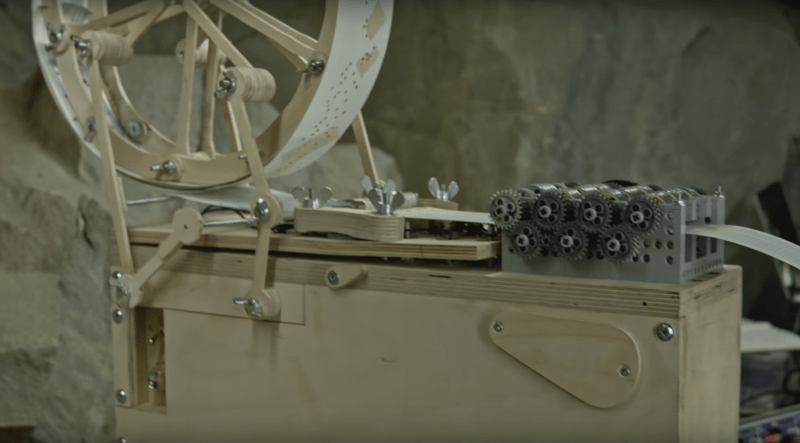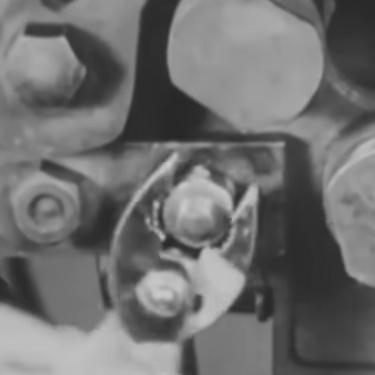Music is a mystery to some of us. Sure, we know what we like when we hear it, but the idea of actually being able to make it baffles us. And the idea of being able to build new instruments to create it, like this paper-tape programmable music box (YouTube, embedded below), is beyond impressive.
You’ll no doubt remember [Martin Molin] of the group “Wintergatan” and his astounding marble madness music machine. This instrument is on a much more modest scale and is centered around an off-the-shelf paper tape music box. But the cheap plastic drive gears kept failing under performance conditions, so [Martin] headed to what appears to be his cave-based workshop and started grinding. He prototyped a new paper drive from Lego Technics, and while it worked, it needed help to pull the paper. What followed was an iterative design process that culminated in a hybrid of plastic and metal Technic parts that drive the paper reliably, and a musical instrument that’s much more than just a tinny wind-up music box. Hear it in action below with another new instrument, the Modulin, which sounds a little like a Theremin but looks like – ah, just watch the video.
The build video hints at more details to come, and we’re hoping for a complete series like that for the marble machine. We’d also love to see details on the Modulin too – if there ever was a hacked musical instrument, that’s it.

















Another beautiful done instrument (or two) and equally beautiful song.
That “modulin” reminds me of a gutted Tek scope, but it sounds a heck of a lot nicer.
Thanks, great videos on process of iterative design.
wow, i love this rock wall
He is an artist, a true artist.
That guy deserves applause
Wow, I was listening to Wintergatan as I opened Hackaday, and here this article is.
They make some excellent music with some excellent homemade instruments. I’m really looking forward to a video explaining the Modulin; making one of my own would be awesome.
Double creativity. Bravo, maestro!
Awesome stuff and the last one featured here was amazing as well. I just have to ask though: Did the vibrato in the Modulin seem off in comparison to his hand motions to anyone else? I understand this is art but I wonder if that part of the performance was real or just “lip-synced”, if you will.
Pretty sure one of the two thumb wheels on the front of the Modulin is for the vibrato.
Then why shake his hand?
to modulate the modulation
It looks like he’s got some kind of conductive ribbon he’s pushing his finger tips against, so it’s entirely possible that by wiggling his fingers he’s subtly changing the resistance of the skin on the pads of his fingers, modulating the sound. It could also explain some of the inconsistency in it. Well, that and Youtube is notorious for having subtle sync issues with audio and video.
Amazing. This guy took something completely devoid of soul – a music box made of gears and wood and wire – and made something whimsical and delicate. The music sounds like it belongs in a Tim Burton movie about a balloon that falls in love with a pincushion. I am very impressed.
speechless….bravo
Looks like the bastard offspring of a player piano and a spinning wheel.
This is AAA – Anti-Arduino Awesomeness
If you liked the modulin, this is a great instrument in the same vein: the UDAR https://www.youtube.com/watch?v=j5TqshbnzXA
motor noisy as hell ??? good work
I like the build, the music has a light feel and is enjoyable, however a few pointers on the Lego side. The duck-tape on the gears contacting the paper is going to cause issues later, slip, sticky goo, quick wear. I would have used rubber tiers or even put O-Rings on the units contacting the paper. You could use and over/under pattern to increase tension without as many sets needed. One can also use a system with Lego shocks/springs to keep tension and allow for a quick release if you want. Last was seeing the gear set come apart from its own stresses could be mitigated with more Lego but I love the direct drill and screw method (I honestly wish as a child I had done that in a few of my projects)
Take some tips from player pianos. The supply could just hang or be spooled. The wheel needs to be on the take-up at a constant angular velocity (easy) and pull the paper thru at tempo constant.
What is interesting is seeing digital music editing the way it was first done a century ago. Tape, punching in and pencil marks makes this the original, not a perfect digital copy!
The modular synth has two wheels for bending pitch and vibrato. I noticed no lag or anomaly. The bends are obvious, better than the slides with the fingers. Vibrato can be tiring to make for long passages by hand, Don Leslie did something about that some time ago.